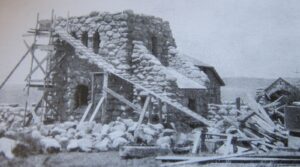When our son Michael was ten years old, he’d been given a school assignment to find two poems. When I saw what Michael had found I was a little shocked. Soon after that, his teacher reported to us that Michael’s choices weren’t appropriate for 5th grade.
They were both Jeffers poems. If memory serves, one of them was Shine, Perishing Republic—let’s just say not exactly the Pledge of Allegiance. The other poem began with a woman torturing a horse. Admittedly, I was amused that our son had got into a bit of trouble because I’d left Robinson Jeffers lying around the house. Not Hustler magazine—Robinson Jeffers: environmental visionary, nature mystic, prophet, poet of California.
The poem with the woman torturing the horse, titled Apology for Bad Dreams, is reportedly based upon actual events, but that’s really beside the point. People are sometimes cruel. We know that. Why, then, is Jeffers so tenacious about telling these stories about sin and mayhem? Is it just that sensationalism sells? Sex and violence, after all, had been good to Jeffers. This is the critique of his work that this dark poem seems to answer.
It is important to keep in mind that much of what Jeffers wrote was written in the aftermath of the Great War, now known as World War I. The Great War was perhaps the watershed event of the 20th Century. It changed everything, including Robinson Jeffers. It transformed Jeffers into a radical anti-war poet, and it seems to me it brought out his demons.
There was some lag-time involved. So far removed in idyllic Carmel, war reports must have lacked immediacy. During the actual event, Jeffers appeared to have been something of a war enthusiast at times, having more than once expressed a desire to enlist. But the grim dawn of the modern age did finally arrive over Bohemia-by-the-Sea, and in the blood-red light of the new era, Carmel ceased to be a pretty place, and Jeffers stopped writing pretty rhymes.
Apology for Bad Dreams is a poem in four parts (I–IV). It can be summed up thus: beautiful places, like capricious gods, call out for tragedy; they must be appeased with cruel sacrifices, real or imagined.
The voice of the poem is of a man who lives in the cultural wasteland left by the Great War, looking out across a beautiful landscape, thinking about God.
Part I. Beauty has turned dark, evil. In all its power and profundity, it wishes us ill. You don’t feel it? Remember the War. Think about the trenches full of corpses. Remember the poison gas, the deformed faces and bodies. Let your eyes pile up the dead, brother by brother, until you have piled millions upon millions. Now, look at the beautiful landscape, in the purple light, heavy with redwood. Look—the beautiful Pacific: it resembles a stone knife-blade. See? And look: a farm, there—so miniscule against the mountainside, so insignificant, there: a woman is punishing a horse …
… The ocean
Darkens, the high clouds brighten, the hills darken together.
Unbridled and unbelievable beauty …
… What said the prophet? “I create good: and I create evil: I am the Lord.” (CP 1:208–9)
Part II. So there you have it: all this is the Lord’s doing: the beautiful, the grotesque. But this Lord is not Yahweh or Allah. This is Jeffers’s spirit of place, the coast crying out for tragedy like all beautiful places. The beauty comes up from the core, as does the evil. The beauty has now become grotesque:
… The dykes of red lava and black [demand] what Titan?
The hills like pointed flames
Beyond Soberanes, the terrible peaks of the bare hills under the sun,
what immolation? … (CP 1:209)
The poet sees the evil in the world; ancient, primordial evil—Biblical evil. He sees it in himself, his humanity. He sees it in God. He cannot defeat it; he must appease it. No, this is not a rational response to evil. There’s nothing objective or rational about the world that the poet sees. Reason is no comfort, no help, no use. All we know is that the God of the land craves cruelty. This deep, divine cruelty calls for a primitive response: sacrifice, burnt offerings.
Part III. The former people of this land, all killed off, were a sacrifice. They remain a sacrifice so long as they are remembered. Once forgotten, the sacrifice expires. So long as that memory survives it protects us, reminds us of the cruelty of God, and satiates His appetite for misery.
Part IV. But surely with Jeffers’s pantheistic God all action is ultimately self-inflicted. The God that deforms humanity only deforms himself. Making man self-loathing, he casts self-hate upon himself. Why? There is no making sense of it. There is no reason; only cruelty, power, and passion.
There is a belief among some Jeffers scholars that this poem is a key to Jeffers’s motivation and philosophy as a poet. Even further, it has been suggested more than once that this is his ars poetica, his treatise on poetry itself. The poem does indeed reference his own work and it does strive to justify one of his major themes, but I for one don’t think it definitively addresses Jeffers’s views of his poetry or of poetry in general. There is just too much that this poem leaves out. Refreshingly, Apology does not preach about poetry as some of Jeffers’s other poems do. Alas, I prefer it to anything that might represent an ars poetica. More to the point, I do believe that Jeffers often had the kind of tortured thoughts that this poem seems to reveal, and I find its revelations profound, intimate, and beautiful.
